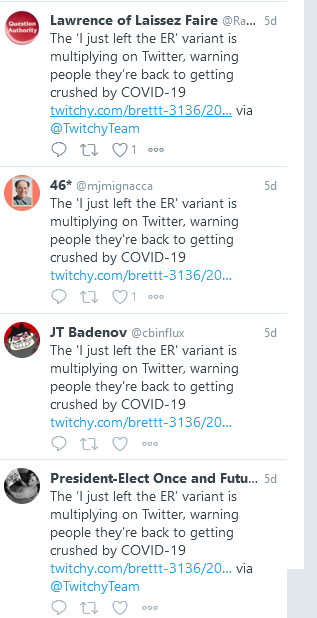This one time I started tracking COVID-19 misinformation...
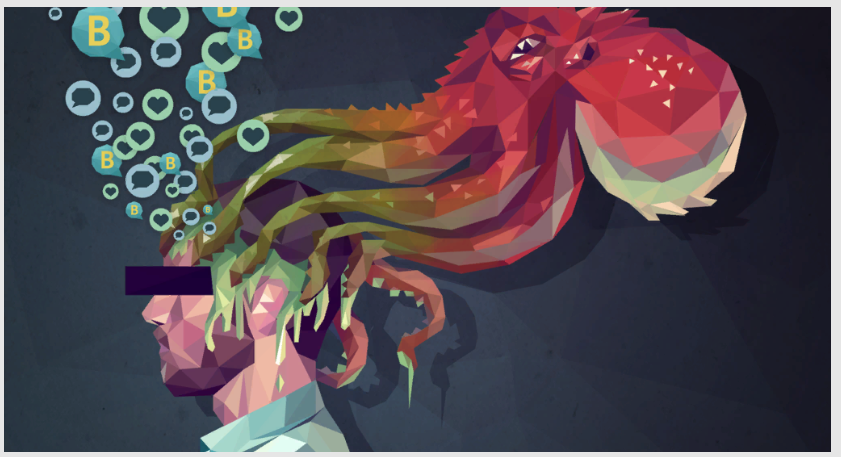
The new year has started and I've been actively playing video games pretty much every chance I get when I'm not doing online classes. When I try to crowbar all of that into my normal life it hasn't left me a lot of time to do much writing. There's been a lot going on now and I've been holding on to a lot of fiery opinions regarding that op-ed in the New York Times and what's looking to shape up into a new the Crypto Wars. I've read good rebuttals to it and feel some regret that I didn't have the gumption to sit down and write one myself but perhaps I'll get it all off my chest some evening and add my voice to the choir of discontent regarding all that.
One of the video games I've been playing here is called Orwell: Ignorance is Strength. The game is pretty straight-forward, not very engaging and feels more like an interactive novel yet I've enjoyed playing it as it doesn't require too much mental effort and the idea behind it is pretty cool. Briefly it's a game where you are tracking political dissidents as a government agent and the game it supposed to show how oppressive systems are upkept by bureaucrats following rules. Each piece of data you choose to track is a moral choice you actively make and it has a real impact on the lives of those you are surveilling.
I wanted to replay the game after reading a couple of books recently. The first one I picked up was This Is Not Propaganda: Adventures in the War Against Reality by Peter Pomerantsev. Pomerantsev's book shows how widespread the problem of seeking truth in the online era has become. What made the book stand out were the parts where his research of modern misinformation campaigns is juxtapositioned with stories about his parents living as Soviet dissidents during the Cold War. I think that I, like the world at large, has collectively chosen to forget that there was a time before the Internet and reading stories about Pomerantsev's parents passing around forbidden samizdat now seems more romantically idealist than horrifying to me, as out-of-touch as that may make me sound. I think these sections were put in partly as a biographical human interest element but mainly to give the reader a sense of how claustophobically grim things can get when information is tightly controlled and you can get arrested for reading the wrong stuff. In that respect I think the book succeeded: it reignited in me that sense that looking for the actually truth matters, even when faced with the worse odds.
Although I agreed with a lot of the principles the book promotes, Pomerantsev's writing felt like reading a history book written in the future: it was clear, the threats are apparently and clearly defined, everything seems obvious when it's explained, and yet the events are laid out in a way that made me feel there wasn't much anyone could do about it. Is there any way a person like myself can do anything about something like Cambridge Analytica, let alone a fucking nation-state actor, from warping society into whatever form it chooses? I might as well yell at the wind to make the weather change. This is likely only how I interpreted the book and to be honest, the target demographic might be the kinds of people who can actually implement systematic change via legislation or whatnot. I just know I don't belong to the class of people who can influence the world by lobbying.
The other book I've been reading recently is The Persuaders by Anand Giridharadas. In this respect, Persuaders was a book to my own heart: it's all about individuals who take it upon themselves to change the opinions of people they disagree with. For a long time, I've been weary of talking to most of my friends who I politically agree with about the fairly extreme views I encounter at where I work. I work in manufacturing and it's generally a pretty conservative environment and the political fringes are far more vocal. I actively engage with, what I consider, pretty vile political opinions with an open mind fairly often. You can only change your mind if you acknowlege, if only subconsciously, that your opinions might be wrong and need updating. I keep that in mind every time I'm listening to climate change denial claims or antivaxx talking points or even more upsetting political opinions. I know on some level that I will unlikely change my mind on most things, but unless I take a stance that I can be wrong, how can I expect the person I'm talking to consider they might be wrong in turn?
This is purely a matter of attitude. As long as I can agree to talk to someone and they agree to talk to me and we can keep most of our emotions out of the discussion, there is a change one of us will end up reconsidering something. And that might even mean that I end up reconsidering a stance I have on something that seems politically disgusting to me. Don't get me wrong, I haven't pulled any 180's and changed my opinion on human rights or anything like that; I am justing admiting that I can hear out some regurgitated claims by Jordan Peterson or Andrew Tate, consider them, and then refute them with the best of my ability while not chiding the person I'm talking to for even considering their nonsense. My opinion of the person suffers, of course, but I try not to let that come out.
It seems like for many people I've talked to about these kinds of encounters I've had with what can be considered the Alt-Right, a pretty common question I'm asked is "why do you even talk to these people in the first place?". I'm baffled by that question whenever it gets posed to me and this is a major point that Giridharadas covers in his book. More and more, it's becoming an acceptable thing to write off people for having bad opinions; as if cutting them off is punishment enough to have them reconsider or that people are too ideologically calcified to take in any new information. Of course the Alt-Right abuses the good faith of the people they argue against online as a way to break the resolve of those who question them and there are ways to deal with that. But I think it goes too far to apply a principle of non-engagement to everyone who you disagree with after talking for more than half an hour. If democracy is about discourse and it's ability to change minds, we need to talk to people we don't really want to talk to. At least in my neck of the woods and the job I'm working at, if I were to just outright refuse to engage with the political discussions that are had, I would be labelled a snowflake and they would continue their discussions without me, in secret, without even a single dissenting voice.
Part 0: Preamble
I wrote two posts about COVID-19 misinformation (or at least what I considered misinformation) the summer of 2021. I've pasted them here as Part 1 and Part 2 along with the pictures I took as I was researching. I'm not too wild about the writing style I had back then but I felt pretty wiped out after spending that much time wading in all that information as it becomes pretty clear towards the end of the posts. It didn't really help that I felt like no one was going to change their mind based on what I wrote, if anyone would even read it in the first place.
I'm glad I did write these posts though as I think it was the first time I decided to do something about some of the clearly baseless claims I came across. It also made me come face to face with how I evaluate information. Why do I think COVID-19 vaccines are safe? Why am I trusting institutions I might not normally be willing to trust? How much do I know about the things I decide on? Am I even capable of understanding these issues to a level where I can make a rational decision? I don't meander too far along these ideas in the following posts, it's just something that stuck with me: source everything you can.
Without further ado, here is the story of that summer I tracked COVID-19 misinformation...
Part 1: Looking Into the Void
I was going to update something small here during my 3 weeks of vaykay I had last month. Ha! Never goes to plan. It was relaxing, have to say. I haven't taken that much time off in one go for over 3 years. I did my best to do absolutely nothing.
I picked up a few books during my time off, one of which was Eliot Higgins' new book We Are Bellingcat. The story starts off like the daydream of any 30-something guy working an office job: Eliot is working as a lowly sysadmin for a small company, feeling like he's never going to play a part in the "Grand Narrative" of history until through pure curiosity and skill is able to pretty much start up his own intelligence agency. It's a very interesting book and I'm glad the book focuses more on what he has investigated and how he went about searching for information. There are little pieces out autobiographical information when needed but mostly the book is actually about Bellingcat and the work they do. Worth picking up if you want something nice and light to read. It'll make you see the news in a new light, that's for sure.
The book left me with a weird craving to scratch at news and information and take a closer look at things and it was in the headspace when I stumbled upon a theory that has been making the rounds on different social media sites. On the 21st of June an article about a doctor from Alabama mentioned dying COVID patients were expressing regret about not getting vaccinated.This story was picked up by many other news outlets. I remember seeing the story pass me by on the front page of Reddit and thought little about it other than it seemed pretty sad. I think it was one of the few news article that week that I actually opened and read in its entirety.
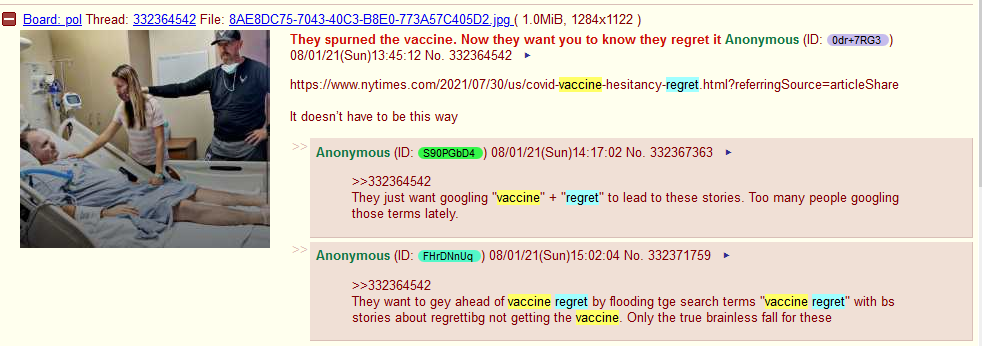
As was to be expected, there was a group of people claiming that the article was either an exaggeration, or worse, a Psy-Op designed to scare people into get the vaccine. Wanting to spread my wings a bit and give this OSINT thing a go, I thought I'd see what kind of information I could find about vaccine regret stories and if there was any evidence that the story was being pushed to one side or another.
There are a few questions that I thought I'd try to answer: 1) Is there any signs that vaccine regret stories are being fabricated? Either stories that people are regretting not getting vaccinated or regretting that they did? 2) Are vaccine regret stories leaning toward pro-vaxx or anti-vaxx?
I wanted to keep the questions fairly broad as this was my first dive into the world of open-source intelligence. I just wanted to find out what a person could find out by just looking around online. For this reason I want to warn you that what I have found shouldn't be taken as the final answer to the questions above. This is just what I've found and if you've come across anything new information, throw me some links in the comments.
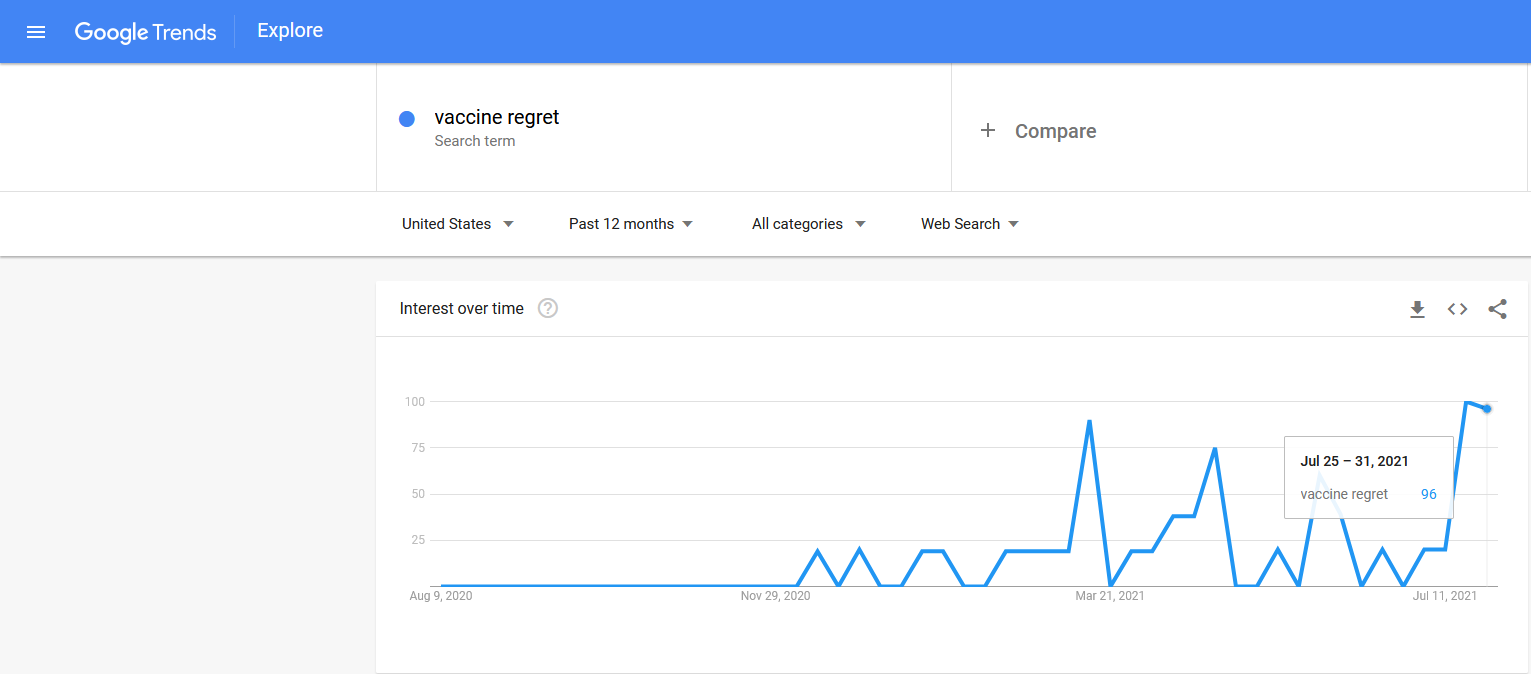
First of all I wanted to see what kinds of general data I could find and try to create a timeline for the whole "vaccine regret" phenomenon. Google Trends shows some spikes for "vaccine regret" searches started about the end of November, which is around the time COVID vaccines became available. The real spike in activity starts around 21 of June, which corresponds with the release of the AL.com article I mentioned above. It would then seem fair to say that it was this article that started the general mainstream interest in "vaccine regret".
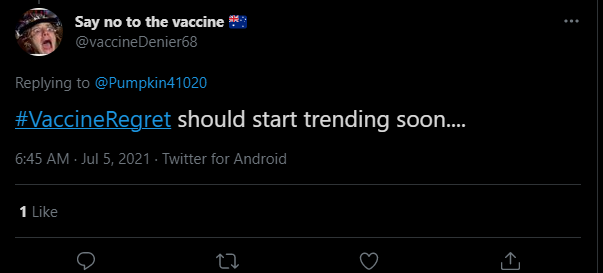
The first time the hashtag "#VaccineRegret" appears on Twitter is 5th of July by the user @vaccineDenier68. Taking a look through the user's account, it is pretty clear that they are very antivaxx and it looks like the hashtag started out as an antivaxx rallying cry. It didn't seem to popular for quite some time. The first time the hashtag was used in a provaxx sense was July 22 by the user @Domneva1 that places it around the time the first vaccine regret article came out.
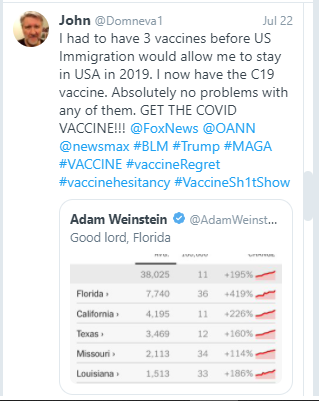
It was only after the AL.com article and a similar one written by the New York Time a week later when there really seems to be a battle of control over the #VaccineRegret hashtag. If you look at the messages using the hashtag you'll see both provaxx and antivaxx, with antivaxx seeming to come up more on top. So if these vaccine regret stories were meant to drown out the #VaccineRegret hashtag with provaxx stories, it seems to have failed. Outside of @vaccineDenier68 that seems to either be obsessed with antivaxxing or a bot, the hashtag would seem to be a pretty mild one and doesn't appear on "Trending" in my area.
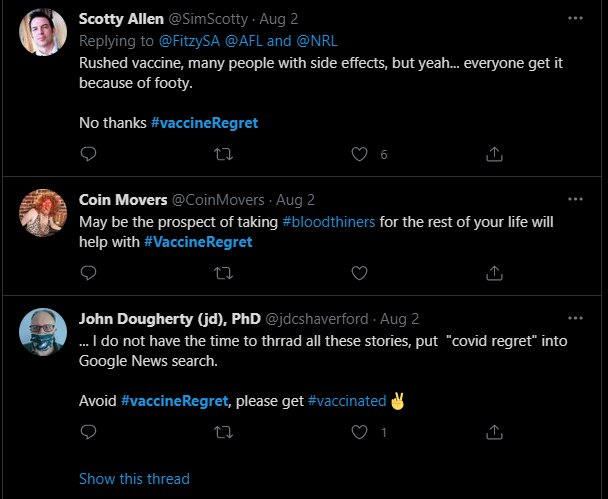
Outside of hashtags, by searching for simply "vaccine regret" starting for 20th of July to the present, you're going to see a similar mix of responses on Twitter. Many are referencing articles on vaccine regret, but in terms of sentiments, it's still pretty much tied between provaxx and antivaxx. Some are calling it a conspiracy by Mainstream Media, like the picture below, but I think a far more likely reason for every news outlet wanting to cover this story is because it's a gripping headline. Until I actually see evidence that Bill Gates is paying off every major new company in the world to promote vaccines for whatever reason, I'm going to side with my theory that journalists are lazy and like copying stories from each other.
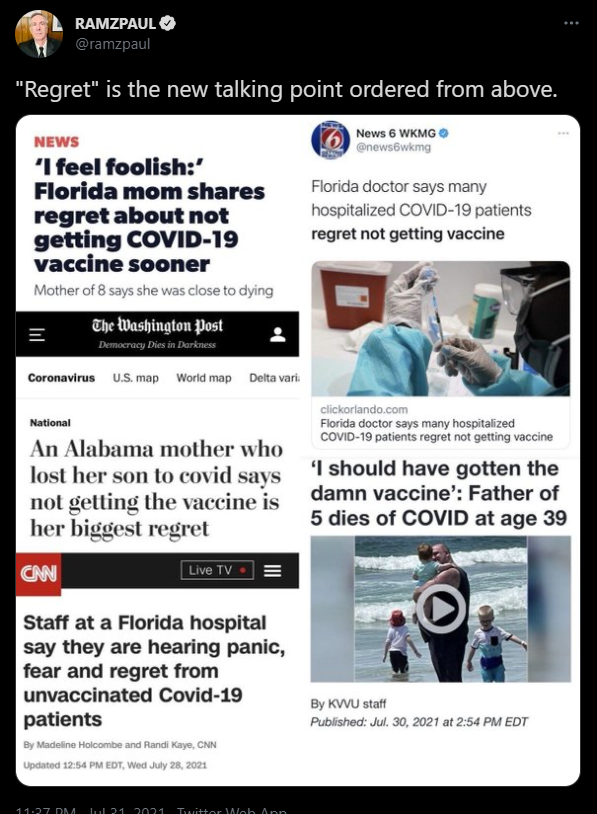
So, that I think answers question 2): "vaccine regret" isn't seeming to lean one way or another. It's just a nice little topic people can fight about online. To be honest, I was a bit disappointed! I wanted to see some kind of clear for/against bias but of course the reality was way more boring. Now for question 1): Is there something or someone pushing the narrative one way or another in a fishy way?
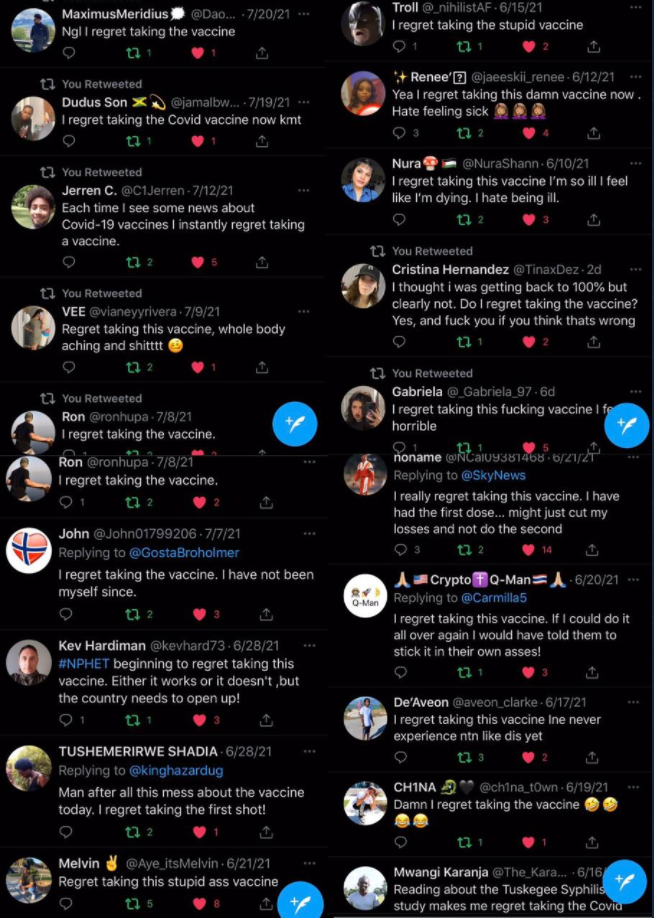
If you search for "vaccine regret", you'll find picture collages where people grab a bunch of users that have tweeted messages of regret about getting vaccinated. The accounts in these pictures often get called bots but I urge you to take a look at some of the accounts in the picture above. Some are shady for sure, but lot of these accounts seems like real people. None of them seemed to linger on the topic though: many just tweeted a regret tweet once or twice and then some hours later started talking about the NBA or whatever. As far as I can tell there isn't any obvious trickery here.
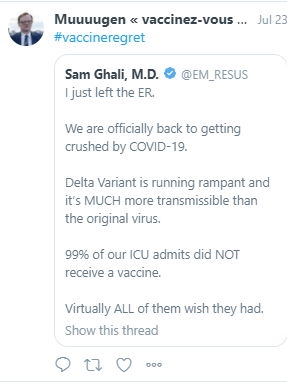
There are plenty of tweets on the provaxx side urging people to get vaccinated and mentioning possible regret as a justification. I couldn't find any clear pattern or typical provaxx response that would make me think that there was any coordinated campaign to push a provaxx viewpoint. The closest I saw to anything like identical wording was when people shared "vaccine regret" articles on Twitter, but that's down to users pressing that little Twitter Share button next to the article.
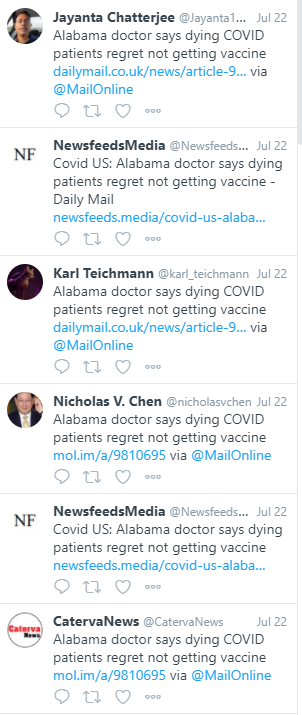
Despite using various terms like "ICU doctor vaccine regret" or "as a doctor regret", I was unable to find more than the occasional Twitter user claiming to be a health care worker and saying that a patient had personally expressed regret over not getting the vaccine. Mostly people have read these articles and shared them. Any similarities in stories comes from quoting these articles. Below are some search queries you can use to take look for yourself. If you can find a coordinated Twitter campaign with various users giving first-hand experiences of patients expressing regret, let me know!
regret not getting vaccination since_time:1626901200 until_time:1628024399 vaccine regret icu doctor since_time:1626814800 until_time:1627765199
So, to answer question 1), what I was able to find after an afternoon of hunting is NOTHING. Again, reality does not fail to disappoint. Instead of unraveling some kind of grand conspiracy, I was left feeling empty and exhausted. I found nothing but what was pretty much to be expected: people throwing shit at each other on the Internet. To be honest, that feels like the point with most of these conspiracy claims. You're not supposed to find anything if you look into them. They are by design vague with built-in deniability. Anyone who looks into them is supposed to feel like shit after looking into them and when sharing their findings, the conspiracy theorist can simply say that "your sources are MSM propaganda" or "the evidence was censored by Facebook" or, my favorite, "yeah, yeah, whatever". Something that took 2 minutes to say took over 6 hours to disprove thoroughly (this includes writing this blog post). I'm really not going to even bother with this stuff anymore, if someone has a point to make now, they can show me the evidence and send me the links directly.
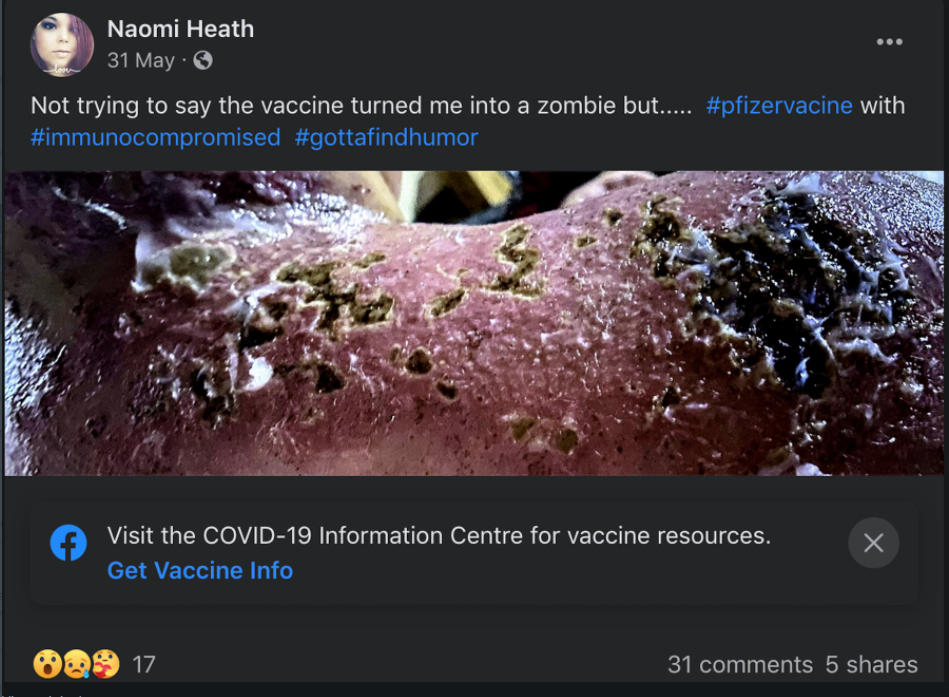
And believe me, I'm going to hold myself to that same standard. I think we are all a little lazy most of the time in sourcing the things we talk about. This whole ordeal has shown me that this is exactly how misinformation flourishes. Take a look at the piece of propaganda above: a rotting piece of flesh with the vague message: "Not trying to say the vaccine turned me into a zombie but...". Most people will not click on that link and only remember the image. Then some of those people are going to end up in a conversation over coffee, remember that image and say "hey those vaccines can have some bad effects, I came across an article where a person got a really bad skin reaction to it"...
Let's do something radical from now on. Let's start sourcing everything we say. I mean EVERYTHING.
Part 2: Drowning in the Fever Swamp
In my last post I mentioned a consiracy theory about a widespread misinformation campaign to spread fear about COVID-19 and push the notion that everyone should get vaccinated. I mentioned that I hadn't found any obvious manipulation surrounding the hashtag #VaccineRegret or that people were pretending to be doctors and claiming that dying COVID-19 patients are regretting not getting vaccinated. Alas, it didn't take too many days until I came across tweets claiming to have proof that a misinformation campaign is underway. All you needed to do is search for "getting crushed by COVID-19" and see the lies pour in.
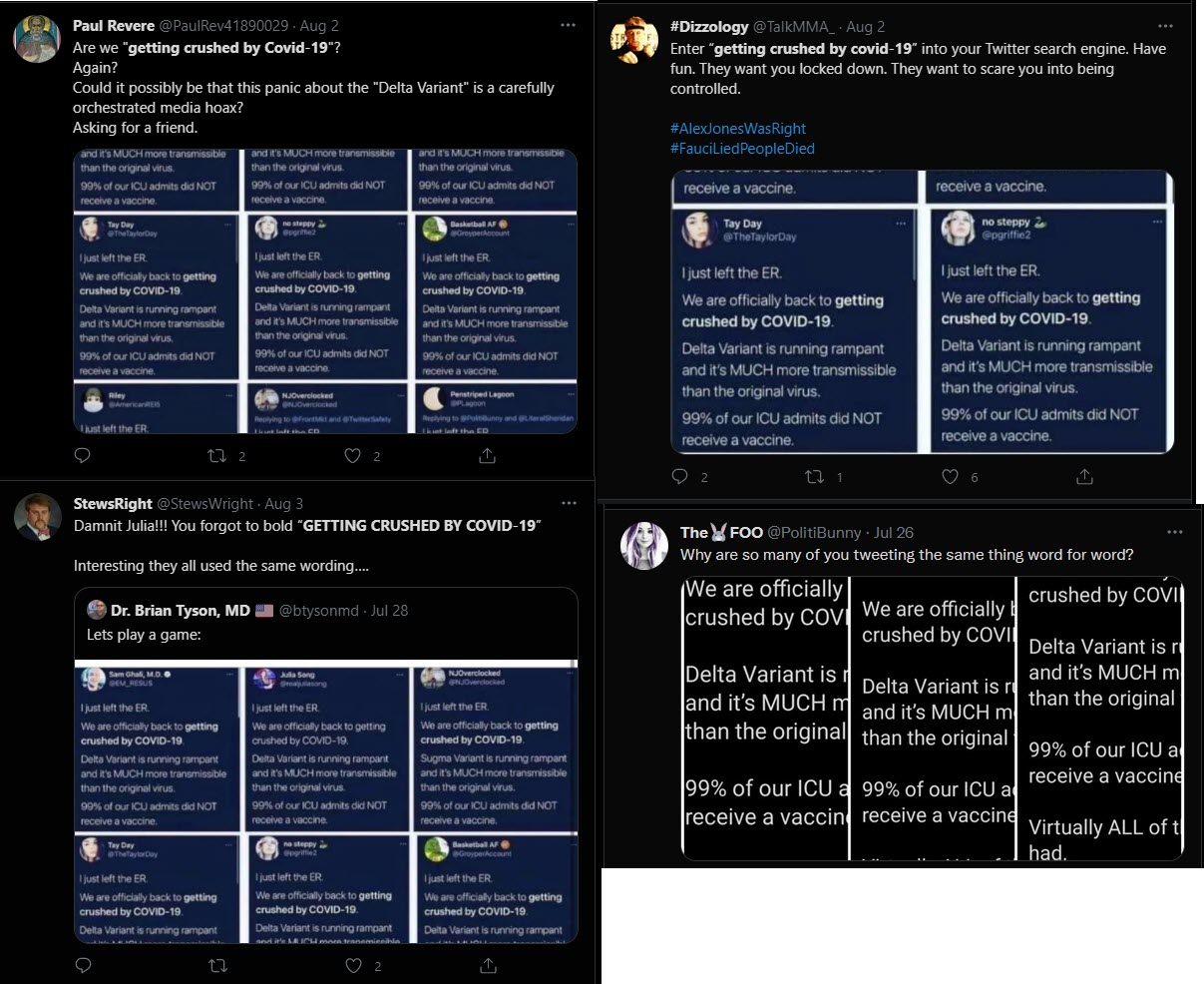
You can imagine my shock. How had I missed this? My original search was confined to #VaccineRegret so that would explain missing this tweet as it doesn't mention regret at all, only that the Delta variant of COVID-19 is bad and overtaxing hospitals. Below is the picture that is being shared widely on Twitter:
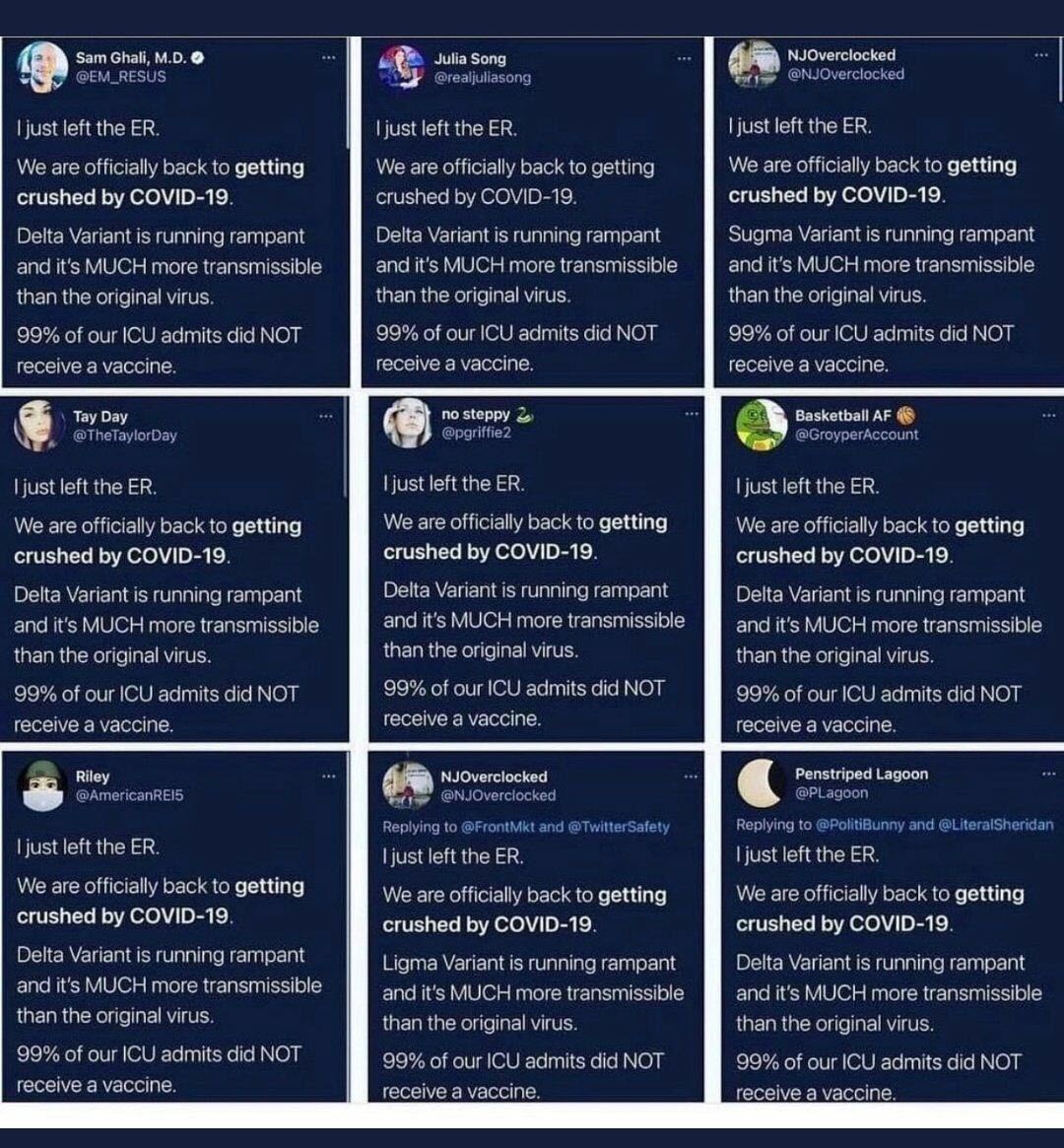
At first glance it looks pretty bad. That's a lot of tweets with identical wording. What's going on? Is this proof of a misinformation campaign? Let's look into it deeper.
IMPORTANT NOTE: I didn't mention this in my previous post but DON'T HARASS ANYONE. I am mentioning the Twitter handles of the accounts involved only for fact-checking purposes. It is Twitter's job, not the users, to moderate and address TOS breaches. Check that I'm not misconstruing anything and check the original accounts mentioned but DON'T HARASS USERS.
So with that out of the way (I am serious about the note above), let's look at the accounts in the picture. Although the picture has nine tweets, there are only 8 accounts involved as two of the picture are from the same account. The accounts involved are:
@EM_RESUS @realjuliasong @NJOverclocked @TheTaylorDay @pgriffie2 @GroyperAccount @AmericanREI5 @PLagoon
Let's start with @EM_RESUS. You might recognize the tweet after it made the rounds on Twitter. Looking into it, this account is the originator of the tweet and looking into his account it looks like he is an actual doctor reporting his own experience working at a hospital.
This is the search term I used to find the original tweet:
We are officially back to getting crushed by COVID-19. since_time:1626987600 until_time:1627333199
So that leaves 7 Twitter accounts to look at. Let's start with the easiest: @NJOverclocked, @TheTaylorDay and @GroyperAccount are all suspended so it's difficult to look deeper into what kinds of accounts they are. Bots? Trolls? Whos knows. I vaguely remember that the Internet Archive has some find of archiving for Twitter and that might help look into those accounts but I feel I spent enough time looking into this as is and so I'll leave that for a later date. Let's just say that they are suspicious. @GroyperAccount has a Pepe the Frog avatar so who knows what agenda that account had.
3 potential bots with unknown motives. That leaves 4 more accounts to look into. Let's look at @pgriffie2 and @AmericanREI5. These two accounts are still online and look like they are real people. (Who knows anymore what "real" even means anymore.) Looking at their accounts, they seems like people who are sharing left-wing political content. I could find the posts with identical wording and they hadn't removed them. It looks like they for whatever reason that they copy/pasted the tweet for unknown reasons. They are not trying to hide it though: they have now openly made it a part of their Twitter identities after people started coming after them. I'd chalk this up thoughtlessness on their part. Maybe they wanted to amplify the message, maybe they had some kind of desire to trick people into thinking they are medical professionals and get get people vaccinated. In any case, this doesn't seem like sophisticated PsyOP agents working to drive the people into a panic.
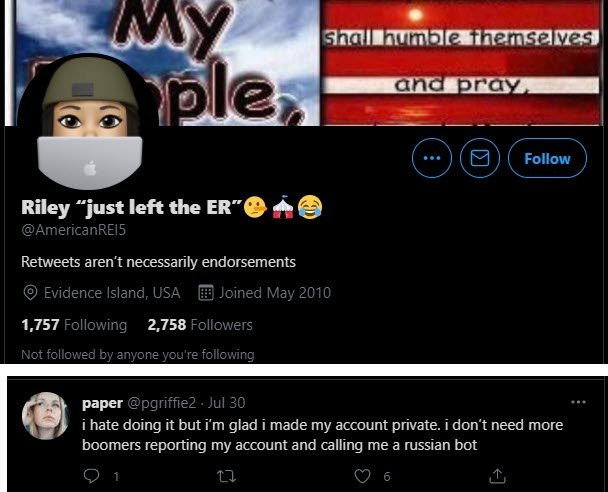
That leaves the last two tweets: @realjuliasong and @PLagoon. These belong to the last category: right-wing aggitators. The most obvious is @realjuliasong. This is clearly a right-wing account trying to get people angry by using right-wing propaganda. Tweeting the identical words of the "crushed by COVID-19" tweet was probably to dilute the message and make the original seem less trustworthy.
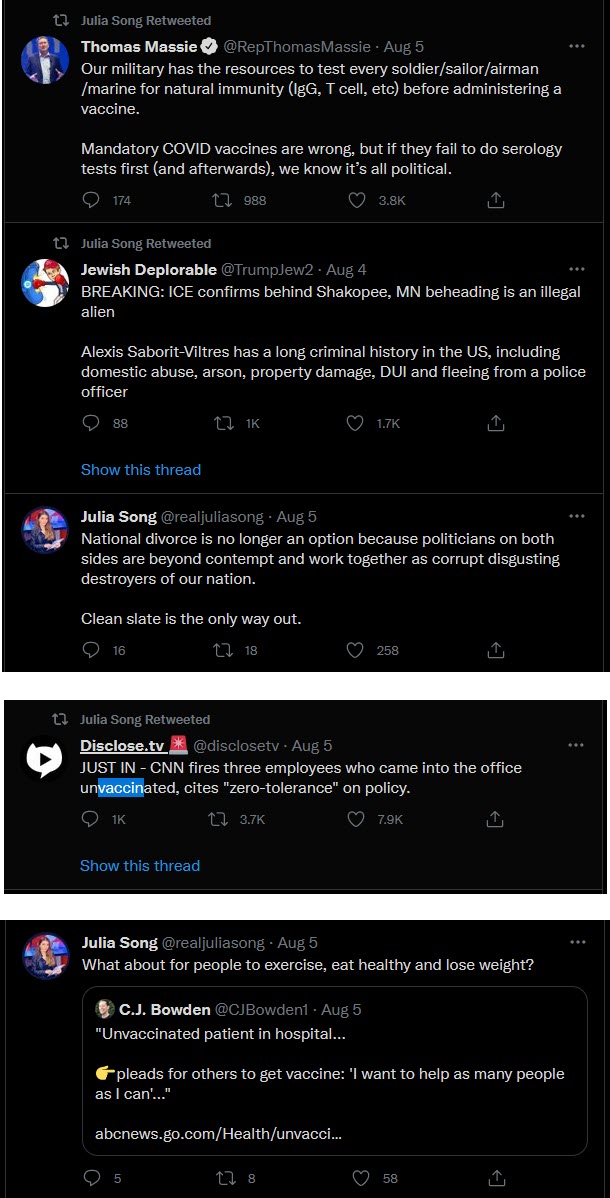
@PLagoon is not as straight-forward. This is an account that posts fairly right-wing slanted material quite a bit. There is nothing he has posted that could be considered exactly anti-vaxx, but he's reposted stuff critical of the FDA and other stuff that makes me wonder why he would want to copy/paste something like the "crushed by COVID-19" tweet. It could be to dilute the message like with the @realjuliasong account, but it seems strange and uncharacteristic of the account.
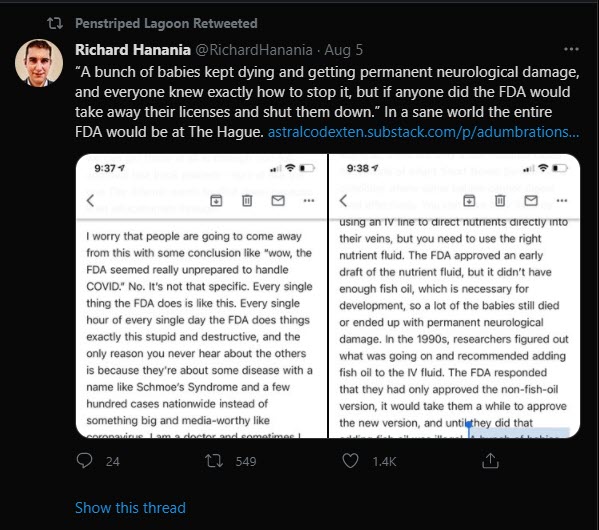
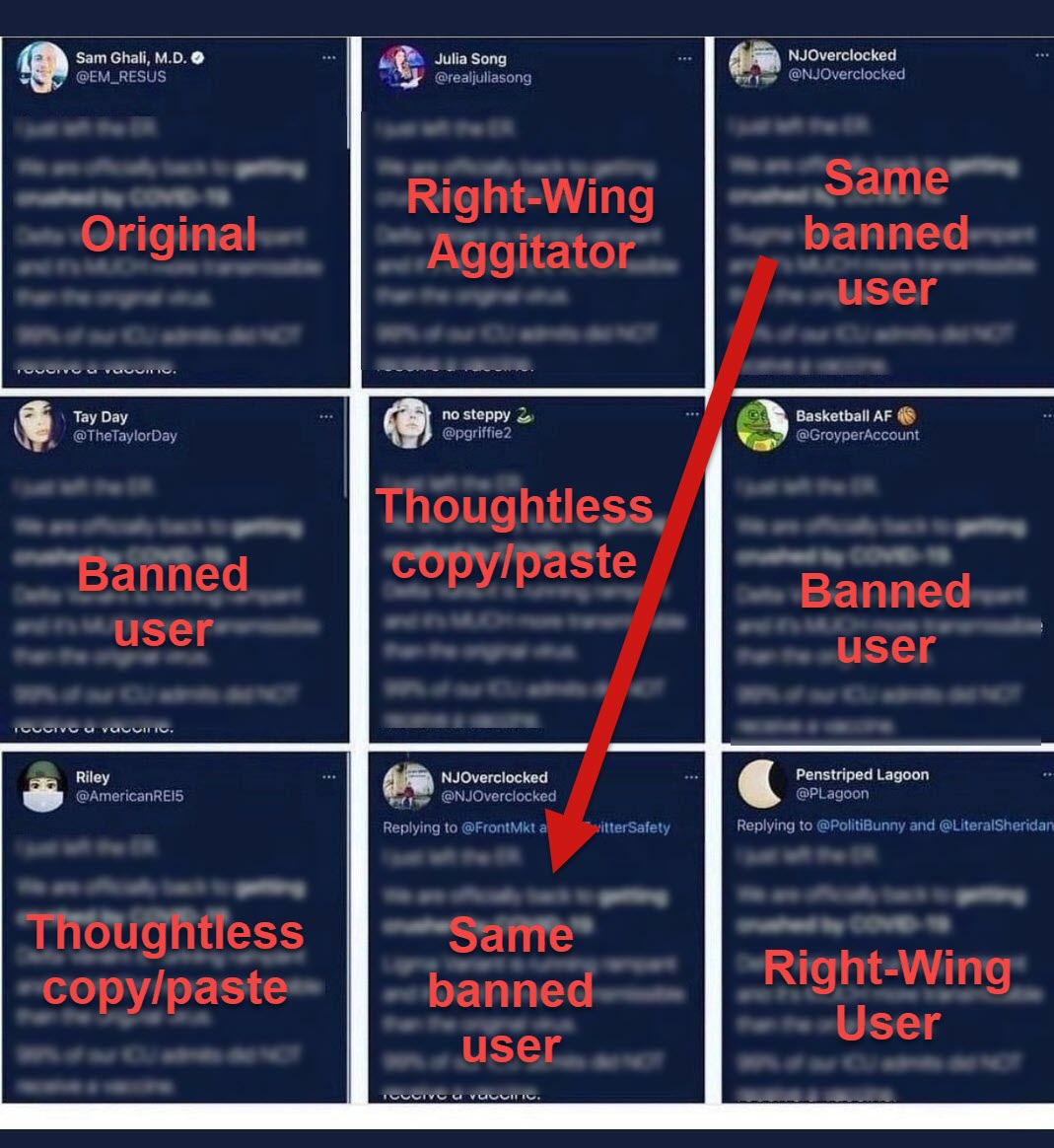
So as the final round-up we have: 1 orignal tweet, 3 banned accounts, 2 thoughtless left-wind copy/pasted tweets and 2 potentially right-wing accounts trying to agitate users. When I went and looked for more you'll find a few accounts copy/pasting the "crushed" tweet but they again get banned or private their accounts. Users like @KCVeteran4thIVY & @RedPillNihilist sound more like the right-wing agitator sort than anything else and there may be some proof that there was an effort to actually attack the original "crushed" tweet. This doesn't yet convince me that there is a left-wing conspiracy to cause people to panic about COVID-19. If anything, it looks more like there are efforts on the part of right-wing agitators to counter any narrative that expresses concern over the pandemic. It took me hours to compile this, look at every account with some level of detail and write a blog post. How many people would go through this amount of effort over a stupid picture? You'd more likely just look at it, think "that's bad" and bring it up during your next coffee break. Maybe I'm the idiot for wasting my time trying to disprove lies that takes bad actors mere minutes to spin up.

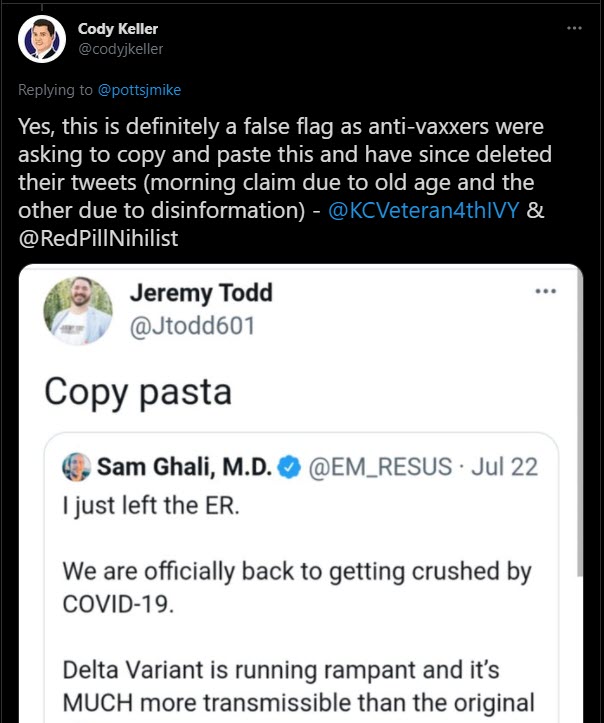
This is going to be it for this episode of INFO WARS. If you too want to be a part of INFO WARS, below are two more pictures seeming to show a left-wing influence campaign in action. One seems to be pre-COVID and about general anti-vaxx stuff but they are here if you want to play a game of "keyboard warrior".
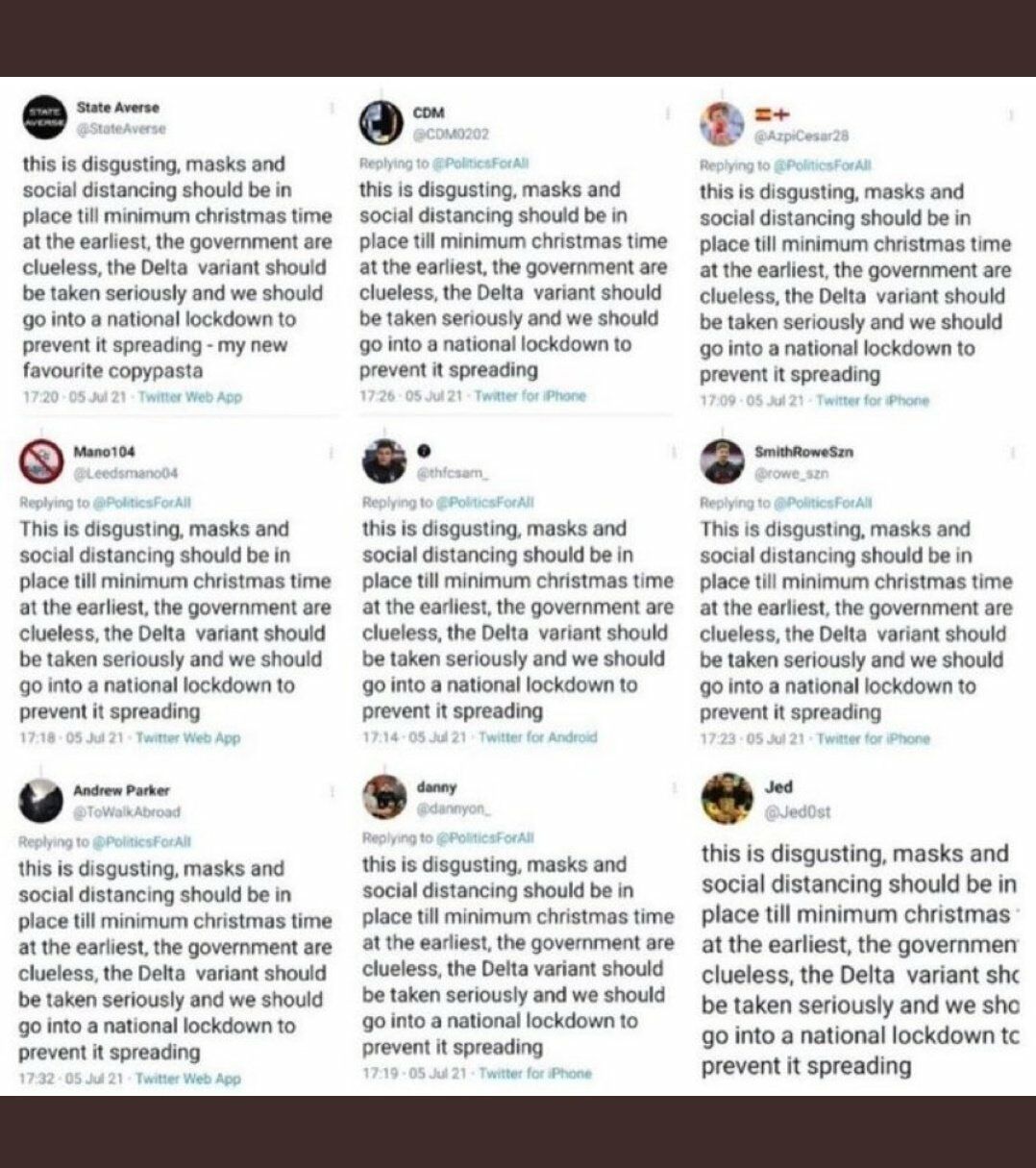
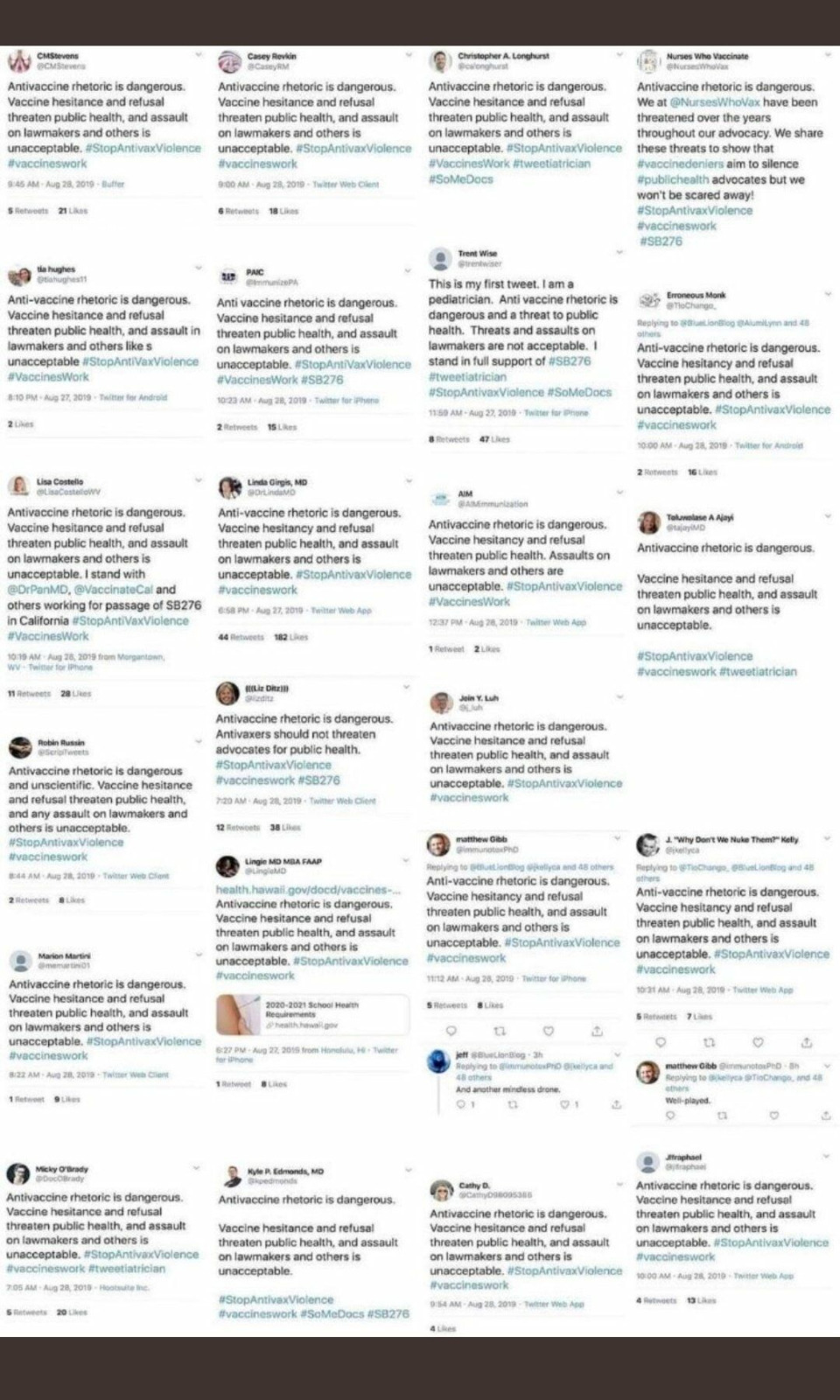
Tweet: "this is disgusting, masks and social distancing should..."
@StateAverse @CDM0202 @AzpiCesar28 @Leedsmano04 @thfcsam_ @rowe_szn @ToWalkAbroad @dannyon_ @Jed0st
For the tweet: "Antivaccine rhetoric is dangerous. Vaccine hesitance...", there seems to be a lot more evidence of wide-spread copy-pasting. I think it may have been a Twitter share button at play, the same things happens when people share anti-vaxx stuff as well:
